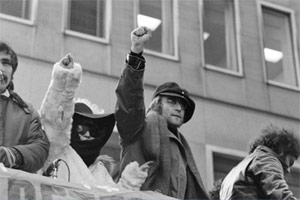
| HOME |
| NERVE |
| REVIEWS |
| ARCHIVE |
| EVENTS |
| LINKS |
| ABOUT US |
| CONTRIBUTORS |
| BACK ISSUES |
| CONTACT US |
 The U.S.
vs. John Lennon (12A)
The U.S.
vs. John Lennon (12A)
Written and Directed by David Leaf and John Scheinfeld
Screening at FACT and Cineworld from
9th December 2006
Reviewed by Adam Ford
Living on Merseyside, and being subjected to Beatles cash-ins around every corner, it is easy to forget that the band were once more than just the brand. In fact, one of the ‘fab four’, John Winston Lennon, went on to become a protest singer who hung out with some of the most famous 1970s American radicals. But it was his anti-war work which annoyed authorities the most, and his determination to get US forces out of Vietnam was matched only by Richard Nixon’s policy to keep them in, and deport Lennon back to Britain. This documentary tells the story of the battle between the United States political establishment and the Liverpool lad who really did shake the world.
John Lennon first came to the attention of the FBI in 1971, when he performed at a benefit concert for jailed MC5 manager and Detroit activist John Sinclair, sharing a stage with Black Panther Bobby Seale and Yippie Jerry Rubin. There was talk of a tour encouraging young people to vote for anti-war presidential candidates, but this was stopped by Nixon’s deportation orders, which were served on the ridiculous basis that Lennon had been done for marijuana possession in Britain.
The U.S. vs. John Lennon features archive footage interspersed with talking head interviews. Unfortunately, it focuses too much on the mechanics of the case, giving little idea of the wider anti-war movement. The choice of interviewees – or possibly of which comments are screened – is woefully uninspired. Many of the former radicals – such as Seale and Stew Albert (who died shortly after the film was shot) – gave up their activism decades ago, and offer nothing exciting here. Contributors from the FBI and from the Nixon White House fail to deviate from their party line, even thirty-five years on. The only comment worth repeating comes from writer Gore Vidal, who links the slaughter in Vietnam to the one currently unfolding in Iraq and Afghanistan: “John Lennon represented life; Mr. Nixon and Mr. Bush represent death.”
Vidal’s remark begs the question, what would happen if a John Lennon figure was on the scene today, with twenty first century media technology and an even bigger chasm dividing rich and poor? There are quite a few anti-capitalist rock stars based in the United States, but only one – Audioslave guitarist Tom Morello – has taken his fight onto the streets. Celebrities don’t stop wars or make revolutions, but they can help ignite the spark of rebellion in the minds of a generation.